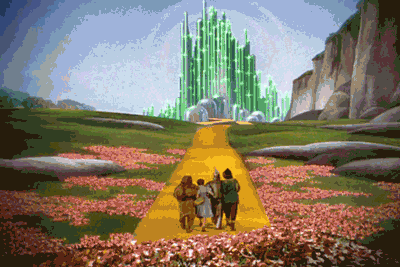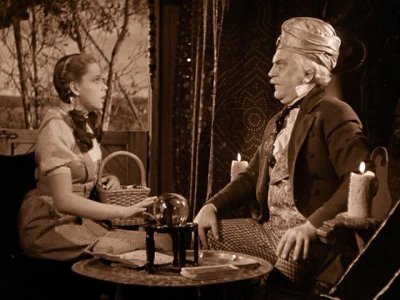The Wizard of Oz is a movie that I first saw when I was younger and have seen multiple times since. However, I have not seen the film in a while and this is also what drew me to write about it for this blog post while applying an oppositional gaze. This a movie that a lot of people have seen and is extremely well known for references and one-liners such as “I have a feeling we’re not in Kansas anymore”, “I’ll get you my pretty”, and of course, “there’s no place like home”. The popularity of this movie is concerning both during the time in which it was first released and the popularity it still has today. This movie has been branded as iconic, a classic, and even one of the greatest films of all time. However, taking on the oppositional gaze, this movie captures a form of the male gaze that contains voyeurism and scopophilia through women characters and places a label on Dorothy as a naïve young girl who is looked to for male affirmation and is undermined by the male characters throughout this film.
Originally based off a book published 1900, The Wizard of Oz tells the story of Dorothy a young girl who lives on a farmhouse with her Aunt Em and Uncle Henry, 3 farm workers that Dorothy considers family, and her dog Toto. After running away and an encounter with a “psychic”, she returns home in the middle of a tornado and is rendered unconscious, she wakes up to the land of Oz. Her quest then is to find a way back home while simultaneously meeting three friends along the way, Glinda the good witch, the wicked witch of the west and the wizard of Oz.
This movie was first released in the late 1930’s and no, it is not a movie that’s ahead of its time. Blatant tones of sexism and misogyny carry the movie and yes, that does have a lot to do with the context and social standing women had in the 30’s but, as a young woman myself, it is concerning to see how much of this movie we see in our lives today. It definitely has roots in the ways in which women are portrayed in current media and society. This may have had a pinch of feminism empowerment back when it was first released, for Dorothy is a young woman trying to find where she belongs, ultimately discovering she had the power to return home all along. However, I would argue that the male gaze is also extremely evident in this movie.
Not only is she portrayed as naïve, but she also put into the role of having to provide affirmation to males. Hooks writes about the roadblock placed for feminist film theory that is based in the “narrative of woman as objects whose image functions solely to reaffirm and reinscribe patriarchy” (Hooks, 255). As a result of this, the male gaze is engraved even in film scenes that are not sexualized or meant to be erotic. This is evident in the scene where Dorothy runs across Professor Marvel as she is attempting to run away from her home. Marvel immediately starts talking at her, not to her but, at her. Before she has a chance to answer his questions about where she is going, he never lets her speak. This establishes him as the dominant power in this scene right away. Even though the viewer can tell he is all over the place, and a pseudo image of a powerful man, Dorothy does not and she hangs on his every word.
This is the result of him taking advantage of her and her obvious vulnerability. Dorothy is serving as a reaffirmation to Marvel that he holds more power (figuratively and literally, because he supposedly can read crystal balls) than her and the maintain the order of the patriarchy.
We can also see sexism and the projection of the concept of the male gaze in the scene with munchkins that make up the Lullaby League and the Lolli Pop Guild. Though it may be weird to think of applying scopophilia and voyeurism here, I believe it is another form of how we sexualize women. Mulvey evidently explains that women are often associated with a “to-be-looked-at-ness” in which they become objects and a thing for display (Mulvey, 33). As we compare the Lullaby League, an all-female group, to the Lolli Pop Guild, an all-male group, we see this sense of voyeurism. The Lullaby League are dainty women, dressed in all pink, a “feminine color”, with tiny revealing leotards on. It also should be noted that no other female munchkin is dressed this way (the others have long skirts on and long sleeves), further emphasizing that women who are in the spotlight, performers, entertainers, can only hold merit if their appearance is attractive to the male. In addition, the welcome song they sing is extremely high pitched, creating an even bigger contrast to that of the male group the Lolli Pop Guild. These men are not dressed in a way that exploits their physical bodies but rather, in a way that lets them stand apart from each other. The Lullaby League women are all wearing identical outfits that take away their individuality while the Lolli Pop Guild are allowed to vary in color and hairstyle making each male his own person.
There is such a variety of themes in this movie and yes, there are some feminist moments in the film, such as Dorothy having the courage that the Scarecrow and the Tinman lacked, to stand up to the Lion or, even the Glinda’s role of providing guidance to Dorothy throughout her journey, rather than finding this guidance in a male figure. However, the ending scene once again places Dorothy as a naïve young woman that the other characters do not take seriously. In this scene she is surrounded by characters that are supposed to be like family to her and they laugh off what she tried to tell them about what happened to her. Even though Dorothy does not have a romantic relationship in this film and is not eluded to having one in the future, Mulvey’s point of female isolation and display for the male to own still pertains in this scene (Mulvey, 35). Her efforts to make herself heard fail, go unnoticed and are literally laughed at.
The Wizard of Oz will remain a classic, I have no doubt about that, but it is important to be able to analyze the aspects of film that are so deeply engraved in our views and perceptions of women today. Voyeurism and sexism come up often in this film and call for a stronger analysis of past works.

References
Hooks, Bell. “The Oppositional Gaze: Black Female Spectators.” Movies and Mass Culture. Rutgers University Press. 1992. pp. 255
Mulvey, Laura. “Visual Pleasure and Narrative Cinema.” Feminist Film Criticism. Indiana University Press. 1990. pp 33-35


 Mulvey also states, “her visual presence tends to work against the development of a storyline, to freeze the flow of action in moments of erotic contemplation” (pg. 33). In a sense, women become a potential downfall for the male as he attempts to move the narrative along. We can see this played out as Meg becomes the downfall of the hero; we see Hercules “freezing” and losing focus while fighting a monster because he is too focused on her and again when Hercules makes a deal with Hades over the protection of Meg, his object and the focus of his gaze. He literally has to surrender his strength and in doing so, the high heroic status he achieved, in order to keep her safe.
Mulvey also states, “her visual presence tends to work against the development of a storyline, to freeze the flow of action in moments of erotic contemplation” (pg. 33). In a sense, women become a potential downfall for the male as he attempts to move the narrative along. We can see this played out as Meg becomes the downfall of the hero; we see Hercules “freezing” and losing focus while fighting a monster because he is too focused on her and again when Hercules makes a deal with Hades over the protection of Meg, his object and the focus of his gaze. He literally has to surrender his strength and in doing so, the high heroic status he achieved, in order to keep her safe. In this song we see that she has shame, cognitive dissonance and wants to reject the notion of falling in love with a man because she’s learned from the past not to trust men. However, the true intention of her character (needing/wanting Hercules) is the one that comes out strong in the end and supports Mulvey’s claim.
In this song we see that she has shame, cognitive dissonance and wants to reject the notion of falling in love with a man because she’s learned from the past not to trust men. However, the true intention of her character (needing/wanting Hercules) is the one that comes out strong in the end and supports Mulvey’s claim.  Additionally, Hercules’ whole journey was about finding out where he belongs and thinking this means regaining his god status but in the end decides to give it all up for Meg, the object who he has now won. Choosing to remain human established him as superior in relation to Meg and places him at the top of the patriarchy. This also supports Mulvey’s castration complex and voyeurism where men see women as a threat due to potential castration and one way to overcome this is to use voyeurism to instead control the women as the man then gains control and possession over what was once threatening to him. Which, in Hercules’ case, was more important than returning with his family and becoming a god again.
Additionally, Hercules’ whole journey was about finding out where he belongs and thinking this means regaining his god status but in the end decides to give it all up for Meg, the object who he has now won. Choosing to remain human established him as superior in relation to Meg and places him at the top of the patriarchy. This also supports Mulvey’s castration complex and voyeurism where men see women as a threat due to potential castration and one way to overcome this is to use voyeurism to instead control the women as the man then gains control and possession over what was once threatening to him. Which, in Hercules’ case, was more important than returning with his family and becoming a god again.
